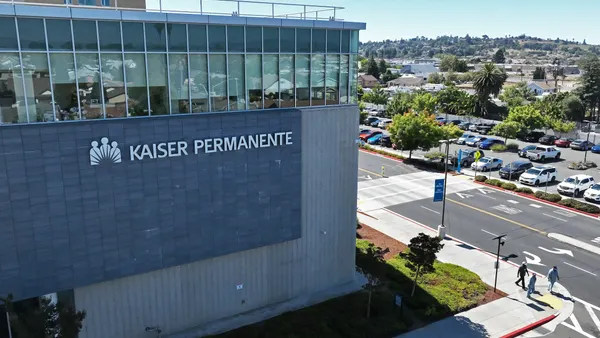Dive Brief:
- CareFirst BlueCross Blue Shield's patient-centered medical home (PCMH) program saved more than $267 million in its first three years of operation, the insurer said July 10. The program was launched in 2011 by the regionally dominant insurer.
- More than 80% of all primary care providers in CareFirst's service area, including parts of northern Virginia, the District of Columbia and Maryland, participate in the program. CareFirst has seen the overall rate of increase in medical care spending for its members slow to 3.5% in 2013, down from an average of 7.5% annually in the five years before the program’s launch.
- Compared to its non-PCMH members, CareFirst enrollees in PCMHs had 6.4% fewer hospital admissions; 11.1% fewer days in the hospital; 8.1% fewer hospital readmissions for all causes; and 11.3% fewer outpatient health facility visits per 1,000 members, the insurer said.
Dive Insight:
Overall, CareFirst reported that healthcare costs for its 1.1 million members covered by PCMHs were $130 million less than projected in 2013, or 3.2% less than the population's expected cost of care. That cost savings is steadily up from 2.7% in 2012 and 1.5% in 2011.
Overall, 4,000-plus primary care providers, including primary care physicians and nurse practitioners, participate in CareFirst’s PCMH program. Panels of five to 15 physicians coordinate members' care, earning outcome incentive awards based on quality of care and savings achieved against projections. In 2013, seven in 10 panels got financial awards averaging $25,000 to $30,000 per physician.
Several years ago, CareFirst BlueCross BlueShield spent billions of dollars on hospital procedures, drugs and specialty physicians to treat sick members, according to The Washington Post, and only one dollar in 20 went to internists, family practitioners and other front-lines primary care providers.
The result of shifting the balance? "There will probably be hospital closings and hospital consolidation" in Maryland, due to such efforts by payers to reduce unneeded procedures, Susan Dentzer, a senior health policy adviser at Robert Wood Johnson Foundation who has studied CareFirst’s PCMH program, told The Washington Post.













